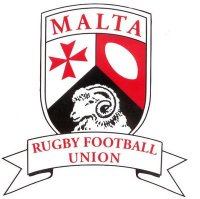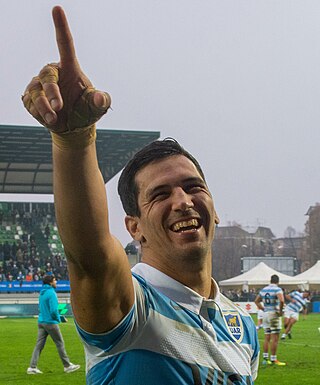
Approximately 5 million of the 17 million people in the Netherlands are registered to one of the 35,000 sports clubs in the country. About two thirds of the population older than 15 years participates in sports weekly.

Newcastle Falcons is a rugby union team that play in Premiership Rugby, England's highest division of rugby union.

Rugby sevens is a variant of rugby union in which teams are made up of seven players playing seven-minute halves, instead of the usual 15 players playing 40-minute halves. Rugby sevens is administered by World Rugby, the body responsible for rugby union worldwide. The game is popular at all levels, with amateur and club tournaments generally held in the summer months. Sevens is one of the most well distributed forms of rugby, and is popular in parts of Africa, Asia, Europe, and the Americas, and especially in the South Pacific.

Michael Robert Leighton Blair is a Scottish rugby union coach who was formerly a professional player and the most capped Scottish scrum half in history. He is currently assistant coach of the Kobe Steelers. He was previously the head coach of Edinburgh, and also was an assistant coach with Glasgow Warriors and then an assistant coach of the Scottish national team.

The Netherlands national rugby union team represents Netherlands in men's international rugby union competitions. Nicknamed The Oranges (Oranje), is considered one of the stronger tier 3 teams in European rugby and currently compete in the second division of the Rugby Europe International Championships in the Rugby Europe Trophy, a competition which is just below the Rugby Europe Championship where the top 6 countries in Europe compete. They are yet to participate in any Rugby World Cup.

Rugby union in Russia is a moderately popular sport. Russia was in 2011 ranked 20th worldwide by the World Rugby, having over three hundred clubs and close to 22,000 players nationally. Russian Rugby Championship is the top-level professional competition held in Russia. Krasnoyarsk, in the middle of Siberia, is traditionally the heartland of Russian rugby.

Rugby union in Namibia is a popular team sport in Namibia and its predecessor province of South West Africa. Because Namibia was formerly ruled by South Africa, rugby in Namibia was frequently influenced by events in that country and its domestic competition.

Darlington Mowden Park is a professional rugby union club, based in Darlington, County Durham, England. They currently compete in National League 1, the third division of the Rugby Football Union domestic league competition pyramid, having achieved promotion on 3 May 2014, after defeating Ampthill in the 2013–14 play-off. The club's former name, Darlington Grammar School Old Boys, was changed when they moved to Yiewsley Drive, which was located in Mowden. They relocated to The Darlington Arena, a 25,000 all-seater stadium in Darlington, purchasing the previously-vacated ground for £2 million; Yiewsley Drive had previously been sold to a housing estate company, and the Arena was previously owned by Darlington Football Club. They played their first game at the arena on 2 February 2013, in front of a crowd of over 1,000, comprehensively defeating Bromsgrove 62–7 in a National League 2 North league game.

Tim Visser is a Dutch rugby union player, who played as a winger for the Scotland national team and for English club Harlequins.
Simon Webster is a former rugby union player that played for Edinburgh and Scotland on the wing and centre. He was quick and creative player known for his pace and committed approach to the game. Starting on the wing in later years he was noticed to have bulked up considerably and moved into the centre playing in the number 13 jersey.

Tom Biggs is an English former rugby union footballer who most recently played for Worcester Warriors. His usual position was at wing. Biggs featured in the Zurich Premiership, Powergen Cup and European Cup. He has a twin brother.

Women's rugby union is a full contact team sport based on running with the ball in hand. The same laws are used in men's rugby union with the same sized pitch and same equipment. Women's rugby has become popular recently. These days, women's rugby is gaining a higher profile thanks to international tournaments' exposure and financial investment.

Rugby union in Belgium is a growing sport. The national governing body for rugby union in Belgium is the Belgian Rugby Federation. The national team plays in the European Nations Cup, and as of October 2014, they were ranked thirtieth in the World Rugby Rankings.

Rugby union in Malta is a small but growing sport. The national senior men's team are ranked 46th by the World Rugby.

Rugby union in Serbia is a minor but growing sport. The game was first played in Belgrade after the first World War and was revived again in the 1950s. Serbia currently has 12 rugby clubs and around 2,000 players.
John Hardie is a former New Zealand rugby union player who played most recently for Newcastle Falcons. Hardie predominantly played as an open side flanker. He represented Scotland internationally between 2015 and 2022.
The Germany national under-18 rugby union team is the under-18 team of the Germany national rugby union team in the sport of rugby union.
The 2011–12 Pro12 League was the 11th season of the rugby union competition originally known as the Celtic League, the second with its current 12-team format, and also the first with RaboDirect as title sponsor.
Sep Visser is a Netherlands international rugby union player. He most recently played as a dual player for Boroughmuir RFC and Edinburgh Rugby, playing as a centre and a wing.

Matías Moroni is an Argentine professional rugby union player who plays as a centre for Premiership Rugby club Newcastle Falcons and the Argentina national team.















